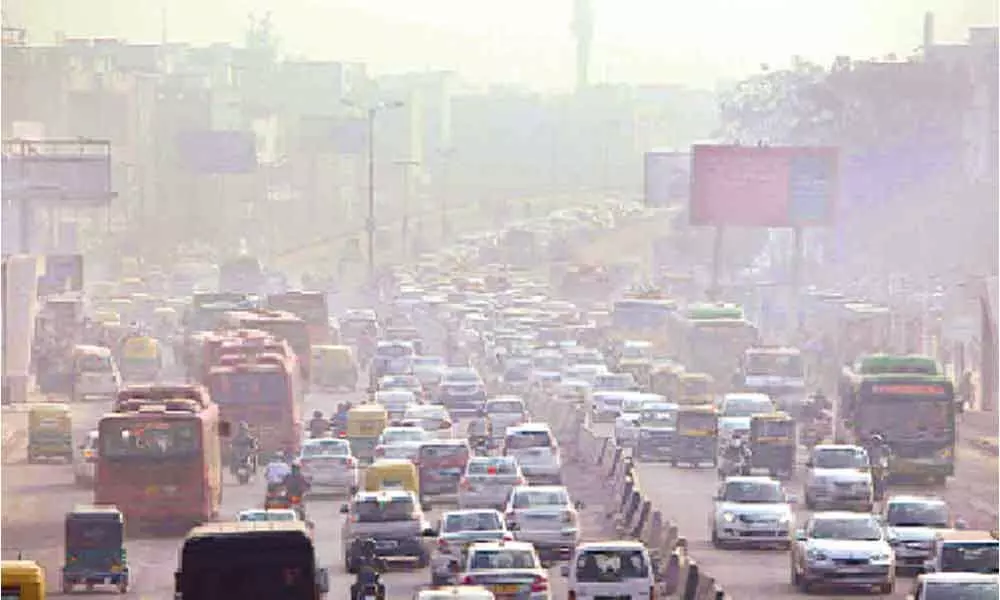Live
- ‘Daaku Maharaaj’ to kickstart musical promotions
- ‘Game Changer’ team teases with a new promo
- Nara Lokesh emphasises overhaul of govt. schools and mid-day meal program
- Amid turmoil, air pollution peaks in Bangladesh as temperatures fall
- Google Trends unveils list of most searched ‘Indian Movies of 2024’
- BGT 2024-25: Hazlewood signals readiness for Brisbane Test after training with full run-up
- Google Presents Deep Research AI Tool for Comprehensive Web Reports
- Share of top 50 stocks to total market cap at all-time low: Report
- Nortje ruled out of SA’s remaining white-ball matches against Pakistan
- Mamata doesn't want INDIA bloc to succeed, claims BJP's Rahul Sinha
Just In
Air pollution caused 12,000 deaths in Bengaluru, says Greenpeace study


Air pollution caused 12,000 deaths in Bengaluru, says Greenpeace study
Greenpeace Southeast Asia analysis of IQAir data from a live Cost Estimator and live air quality data collected by IQAir, PM2.5 air pollution claimed approximately 54,000 lives in India’s national capital in 2020.
Bengaluru: Greenpeace Southeast Asia analysis of IQAir data from a live Cost Estimator and live air quality data collected by IQAir, PM2.5 air pollution claimed approximately 54,000 lives in India's national capital in 2020. Globally, approximately 160,000 deaths have been attributed to PM2.5 air pollution in the five most populous cities. A cost estimator is an online tool that tracks the real-time health impact and economic costs of air pollution in major cities in the world. To show the impact of air pollution related deaths on economy, the approach used by Greenpeace is called "willingness-to-pay", a lost life year or a year lived with disability is converted to money by the amount that people are willing to pay in order to avoid this negative outcome.
The cost estimator also sustained the estimated air pollution-related economic losses of Rs 1,23,65,15,40,000. The damage is equally worrying in other Indian cities. An estimated 25,000 avoidable deaths in Mumbai in 2020 have been attributed to air pollution. Bengaluru, Chennai, Hyderabad and Delhi estimated an approximate 12,000, 11,000, 11,000, and 54,000 avoidable deaths respectively due to polluted air.
"Despite recording relatively better air quality this year due to strict lockdown, air pollution continues to be a serious public health issue which also drastically impacts our economy. For the governments of the day, it is crucial that investments are made towards green and sustainable solutions. When we choose fossil fuel over clean energy, our health is put at stake. Polluted air increases the likelihood of deaths due to cancer & stroke, spike in asthma attacks and worsens severity of COVID-19 symptoms," said Avinash Chanchal, Climate Campaigner, Greenpeace India.
"We need to ensure our growth demand is fuelled by sustainable and cleaner sources of energy and cities should promote low cost , active and carbon-neutral transport options that prioritizes walking, cycling, and public transport, the increased use of clean energy and clean transport will not only improve the public health but it will also strengthen the economy and public money" added Chanchal.
Commenting on the revelations made by cost estimator CEO of IQAir, Frank Hammes says, "Breathing should not be deadly. The fact that poor air quality claimed an estimated 160,000 lives in the five largest cities alone should give us a pause, especially in a year when many cities were seeing lower air pollution levels due to less economic activity. Governments, corporations and individuals must do more to eliminate the sources of air pollution and make our cities better places to live."

© 2024 Hyderabad Media House Limited/The Hans India. All rights reserved. Powered by hocalwire.com






